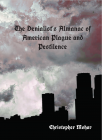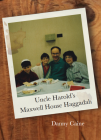Etchings Press at University of Indianapolis announces 2017 publications

Etchings Press, a student-run press at the University of Indianapolis, has announced its annual publications for 2017.
This year’s winners were Christopher Mohar’s novella The Denialist’s Almanac of American Plague and Pestilence, Danny Caine’s poetry chapbook Uncle Harold’s Maxwell House Haggadah, and Sarah Cheshire’s prose chapbook Unravelings.
 Each year, students publish two issues of their university-based literary magazines, a novella, a poetry chapbook, and a prose chapbook. The press aims to publish excellent, purposeful literature and to allow a variety of voices the opportunity to share their stories.
Each year, students publish two issues of their university-based literary magazines, a novella, a poetry chapbook, and a prose chapbook. The press aims to publish excellent, purposeful literature and to allow a variety of voices the opportunity to share their stories.
 The novella contest winner, The Denialist’s Almanac of American Plague and Pestilence by Christopher Mohar, is a piece of apocalyptic literature that features several people who are left behind during The Rapture and must confront why they were left behind and what they are supposed to do next.
The novella contest winner, The Denialist’s Almanac of American Plague and Pestilence by Christopher Mohar, is a piece of apocalyptic literature that features several people who are left behind during The Rapture and must confront why they were left behind and what they are supposed to do next.
“This novella reveals the essence of human nature and has a sense of connectability no matter where the reader is coming from,” said Etchings Press staff member Spencer Martin.
 The poetry chapbook winner, Danny Caine’s Uncle Harold’s Maxwell House Haggadah, holds 20 poems centered around the experiences within a modern American-Jewish family, providing what the author calls a “funny look at faith, family, and commercialism.” Caine’s rendering of the family interactions within this context strikes readers as “insightful and comedic,” as Kevin McKelvey, associate professor of English and Etchings Press faculty advisor, put it. With humor and poise, Caine exposes the modern Jewish family life in America for what it truly is: messy and beautiful, just like every other family, he said.
The poetry chapbook winner, Danny Caine’s Uncle Harold’s Maxwell House Haggadah, holds 20 poems centered around the experiences within a modern American-Jewish family, providing what the author calls a “funny look at faith, family, and commercialism.” Caine’s rendering of the family interactions within this context strikes readers as “insightful and comedic,” as Kevin McKelvey, associate professor of English and Etchings Press faculty advisor, put it. With humor and poise, Caine exposes the modern Jewish family life in America for what it truly is: messy and beautiful, just like every other family, he said.
 Unravelings, Sarah Cheshire’s prose chapbook, is a work of creative nonfiction in which the author shares the story of her experiences processing the emotions and memories left after a relationship that Cheshire calls a “relationship imbued in both intimate creative energy and deep power imbalance.” In her prologue, Cheshire explains her goal to call attention to the way individuals and society handle such situations as they “construct and reconstruct truth.”
Unravelings, Sarah Cheshire’s prose chapbook, is a work of creative nonfiction in which the author shares the story of her experiences processing the emotions and memories left after a relationship that Cheshire calls a “relationship imbued in both intimate creative energy and deep power imbalance.” In her prologue, Cheshire explains her goal to call attention to the way individuals and society handle such situations as they “construct and reconstruct truth.”
